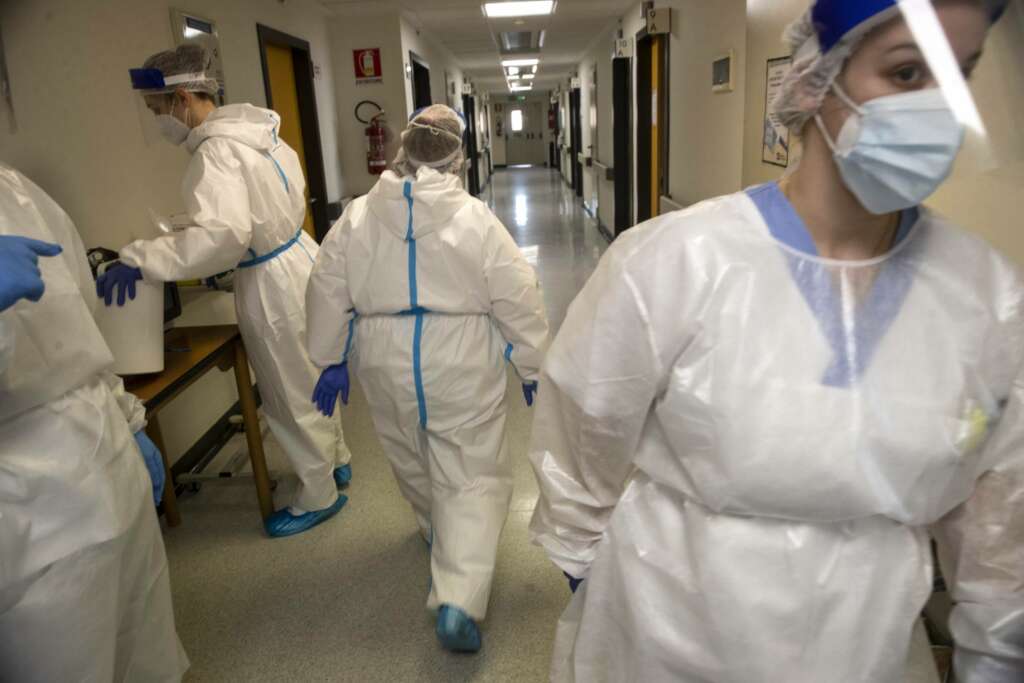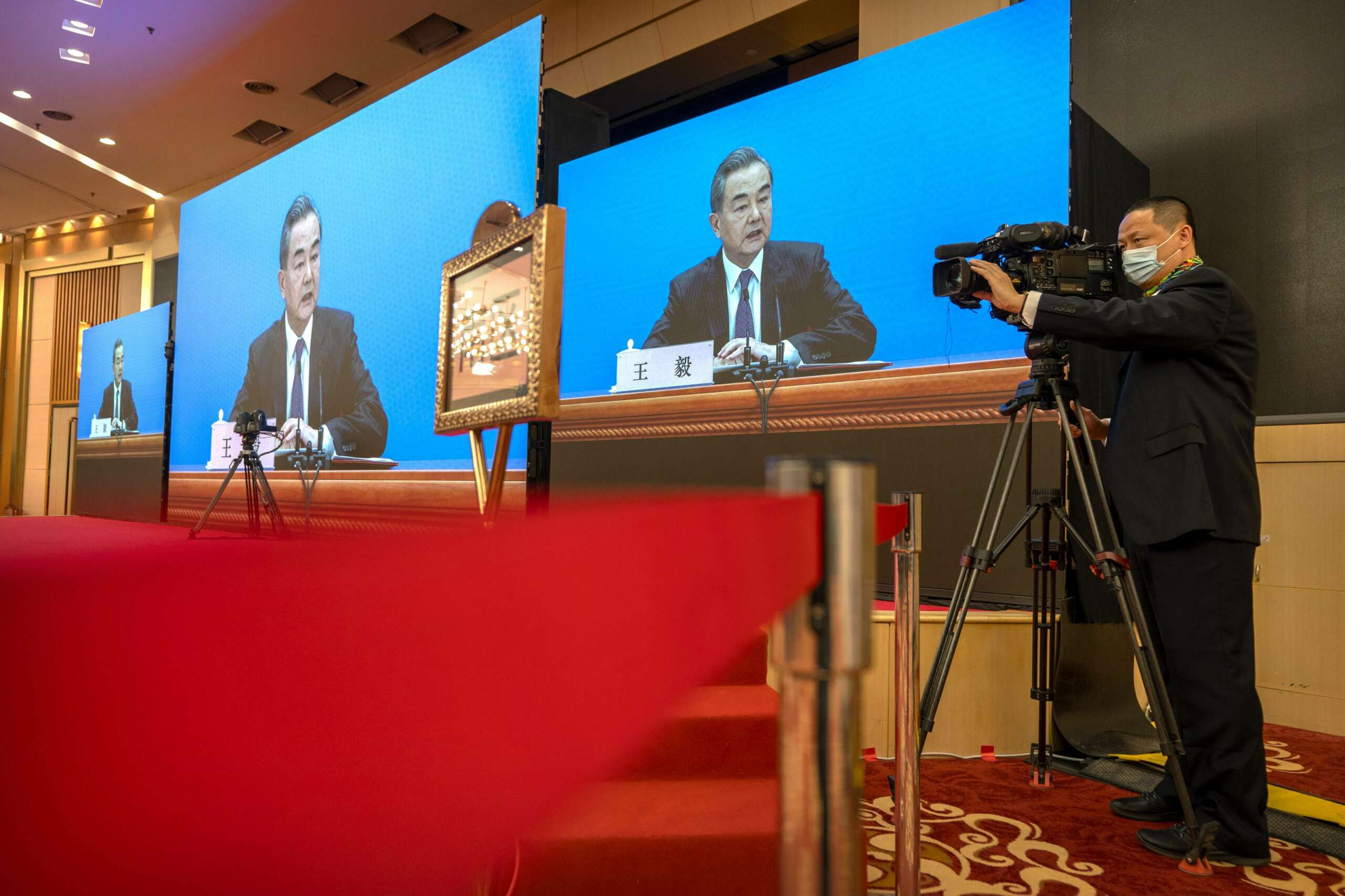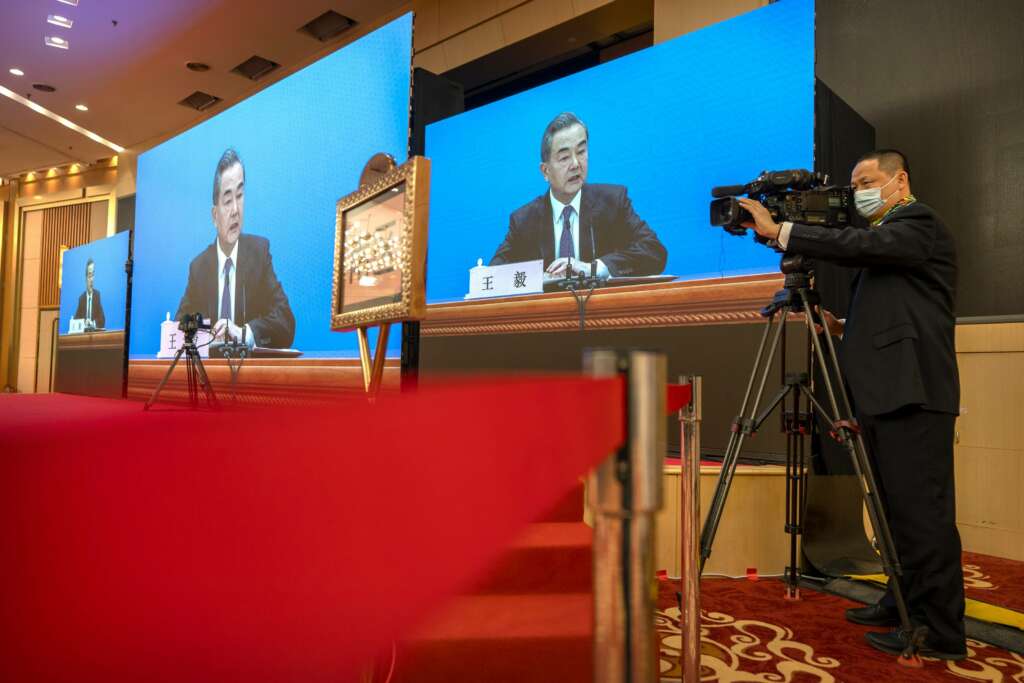
CHARLOTTE, N.C. — Roughly 4 in 10 Americans say they’re still feeling the financial impact of the loss of a job or income within their household as the economic recovery remains uneven one year into the coronavirus pandemic.
The new poll was conducted by The Associated Press-NORC Center for Public Affairs Research. The financial outcome often depended on the type of job a person had and their income level before the pandemic.
The pandemic has particularly hurt Black and Latino households, as well as young Americans, who are now going through their second major economic crisis of their adult lives.
The poll shows about half of Americans say they have experienced at least one form of household income loss during the pandemic, including 25% who have experienced a household layoff and 31% who say someone in the household was scheduled for fewer hours. Overall, 44% say their household experienced income loss from the pandemic that is still having an impact on their finances.
Thirty-eight percent of Hispanics and 29% of Black Americans have experienced a layoff in their household at some point during the past year, compared with 21% of white Americans.
Overall, about a quarter of Americans say they’ve been unable to pay one or more bills in the last month.
Some 745,000 Americans filed for unemployment benefits the week of Feb. 22, according to the Labor Department. Nearly 18 million Americans remain on the unemployment rolls.
___
THE VIRUS OUTBREAK:
— AP-NORC poll: Many in US still face COVID-19 financial loss
— Russia to make Sputnik V vaccine in Italy, produce 10M doses in year
— CDC advice for U.S. residents: Fully vaccinated people can gather without masks
— Dutch prime minister extends country’s pandemic lockdown
___
— Follow AP’s pandemic coverage at https://apnews.com/hub/coronavirus-pandemic, https://apnews.com/hub/coronavirus-vaccine and https://apnews.com/UnderstandingtheOutbreak
___
HERE’S WHAT ELSE IS HAPPENING:
MINNEAPOLIS — Gov. Tim Walz announced Minnesota is expanding eligibility for the coronavirus vaccine after reaching its goal of inoculating at least 70% of people 65 and older.
The state will expand eligibility to the next two phases of Minnesotans. Walz says it includes people with underlying health conditions and those at a risk of workplace exposure, including about 45,000 people who work at food processing plants.
The next two phases include about 1.8 million individuals who can get their shots starting Wednesday.
They include Minnesotans with specific underlying health conditions such as sickle cell disease, Down syndrome, those in cancer treatment or immunocompromised from organ transplant and those who have oxygen-dependent chronic lung and heart conditions.
___
BUCHAREST, Romania — Health authorities in Romania announced the country’s first recorded cases of the Brazil coronavirus variant in Bucharest.
Authorities say the new variant, which scientists believe is more contagious, was detected in two men ages 38 and 57, who were symptomatic and have pre-existing medical conditions. One, authorities say, had no travel history.
The arrival of the Brazil variant, also known as the P.1 variant, comes days after the South African variant was first detected in the country and infections begin to sharply rise. Nearly 5,000 COVID-19 infections were recorded Tuesday, about double the average number of daily infections recorded last month.
The growing number of infections prompted authorities to impose on Monday new restrictions in the capital Bucharest, while the western city of Timisoara entered quarantine at the same time.
More than 835,000 people in the country of 19 million — which administered more than 1.8 million vaccinations — have tested positive for the coronavirus. More than 21,000 people have died.
___
MILAN — Russia has signed a deal to produce 10 million doses of the Sputnik V coronavirus vaccine in Italy this year.
The deal was announced Tuesday by the Italian-Russian chamber of commerce. It was signed by Adienne Srl, the Italian subsidiary of a Swiss-based pharmaceutical company, with the Russian Direct Investment Fund.
The Italian-Russian chamber of commerce says Russian authorities are working on 20 similar collaborations across Europe and Sputnik V has been registered in 45 nations worldwide.
The Russian Direct Investment Fund that bankrolled the vaccine and markets it abroad has said the production of Sputnik V will span several countries, including India, South Korea, Brazil, China, Turkey, Iran, as well as Belarus and Kazakhstan. Some manufacturers abroad have produced trial batches of the Russian vaccine, but there are few indications they have so far produced any large amounts of the shot.
___
SARAJEVO, Bosnia-Herzegovina — Bosnia has reported a huge rise in daily new infections with the coronavirus amid warnings that hospitals in the Balkan country are rapidly filling up.
Authorities on Tuesday reported 1,251 new infections in the past 24 hours, compared to 400 new cases reported on Monday and similar numbers over the weekend.
The surge has prompted authorities in the capital Sarajevo to announce the closure of all bars, restaurants and non-essential shops for the upcoming weekend. Dozens of owners of small businesses have protested the measure, demanding compensation.
Vaccination in Bosnia has been slow after shots through international COVAX program has been stalled. Bosnia has received 10,000 doses of Astra-Zeneca vaccines from Serbia, while the country’s Serb-dominated region has acquired Russia’s Sputnik V vaccines.
Bosnia confirmed another 48 deaths, raising the total to more than 5,000 coronavirus deaths in the country of 3.5 million.
___
BUDAPEST — Hungary set records Tuesday for the number of COVID-19 patients being treated in Hungarian hospitals amid a powerful surge in cases.
Nearly 350 people in Hungary were hospitalized with the virus in the last 24 hours, bringing the number of hospitalizations on Tuesday to 8,270, breaking the previous record of 8,045 set on Dec. 8. The number of patients on ventilators also set a new record with 833. Health care experts say it could soon reach the threshold of 1,000, the maximum number of critical patients the country’s health system can handle.
The total number of COVID-19 deaths in Hungary increased by 158 to more than 16,000, the most in a single day since before Christmas.
A new round of lockdown measures went into effect in Hungary on Monday requiring most shops to close for two weeks. Kindergartens and primary schools are closed until April 7.
___
COPENHAGEN, Denmark — Norwegian Prime Minister Erna Solberg threatened to impose new nationwide coronavirus restrictions, including closing amusement parks and gyms and banning the sale of alcohol if an increase in new cases is not brought down.
“We still have a steep hill ahead of us,” says Solberg, calling “for one last effort. That we together go up this hill and hope that that this time we finally manage to reach the top.”
In an address to parliament, she urged citizens to stay home for the Easter break in early April.
She vowed Norway, which has had 74,940 cases and 632 coronvirus deaths, “will crack down on local outbreaks even faster. She said a year ago the Scandinavian country “introduced the most intrusive measures in peacetime.”
“If we succeed (now), there will be no need for new national measures. If we fail, we must tighten quickly,” she said.
___
WELLINGTON, New Zealand — New Zealand has opened its first large vaccination clinic as it scales up efforts to protect people from the coronavirus.
The clinic in south Auckland will initially target household members of border workers. New Zealand has stamped out community spread of the virus and considers border workers and their families the most vulnerable to catching the disease from infectious travelers.
Director-General of Health Ashley Bloomfield sai initially about 150 people a day will get vaccinated at the clinic, although the numbers will be rapidly increased. Health officials plan to open two more clinics in Auckland over the next few weeks.
“It doesn’t hurt, and it is important for everybody to get it,” said Denise Fogasavaii, the sister of an Air New Zealand employee who has already been vaccinated.
New Zealand plans to use the Pfizer vaccine for all inoculations and hopes to complete its vaccination program this year.
___
ALBUQUERQUE, N.M. — New Mexico is clearing the way for schools to reopen next month as vaccine eligibility is expanding to include shots for all teachers and other educators.
State education officials announced Monday that five-day a week in-class programs would be open to those who want them. Districts also will be required to provide virtual learning options for students who opt out.
As part of the vaccination effort, the state plans to get teachers their first shots by the end of March.
The state is making the move as part of a directive by the Biden administration. State officials have acknowledged that meeting the goal depends on the federal government increasing vaccine shipments.
___
CHEYANNE, Wyo. — Wyoming Gov. Mark Gordon says the state will join a handful of others that have lifted mask-wearing mandates to limit the spread of the coronavirus. The changes take effect March 16.
Also being lifted are requirements for bars, restaurants, theaters and gyms, where employees must wear masks and customers not seated in small groups have to keep 6 feet apart.
Gordon cites Wyoming’s declining number of COVID-19 cases and its success in distributing vaccines as reasons to lift the restrictions.
The statewide order in place since December was set to expire next week. States including Iowa, Mississippi, Montana, North Dakota and Texas also have lifted mask mandates.
___
HELSINKI — Estonia’s government has decided on further coronavirus restrictions due to a rapid rise in cases, especially the variant first detected in Britain, and the Baltic country will enter a lockdown Thursday.
Prime Minister Kaja Kallas unveiled the new measures in an interview with the Estonian public broadcaster ERR saying “the situation with COVID-19 in Estonia is extremely critical.”
Kallas said Estonia’s pandemic situation needs to be addressed quickly to avoid further escalation and hence “we have decided to lock the country in as much as possible.”
With exception of grocery and other essential stores such as pharmacies, all stores and restaurants throughout Estonia are required to remain closed and all indoor sport activities cease as of Thursday. Restaurants will, however, be able to serve food for take-away and drive-in customers.
Kallas said the new restrictions would be in place for a minimum of one month.
The nation of 1.3 million has seen a rapidly increasing number of COVID-19 cases n the past few weeks. The country on Monday reported 1,181 new confirmed cases putting total tally to over 76,183 cases with 667 deaths.
___
HONOLULU — Hawaii has detected a new COVID-19 variant in the islands, one that first emerged in South Africa.
The state Department of Health said Monday the virus, which has technical name B.1.351 was found in an Oahu resident with no travel history.
Some tests suggest the variant may be less susceptible to antibody drugs or antibody-rich blood from COVID-19 survivors.
Acting State Epidemiologist Sarah Kemble said in a statement that a study conducted in South Africa, where the variant was predominant, showed that the Johnson & Johnson vaccine was effective in preventing serious disease requiring hospitalization and in preventing death.
The U.S. Centers for Disease Control and Prevention said that as of Sunday, 81 cases of the South African variant have been detected in 19 states and Washington, D.C.
Hawaii has already detected eight cases of the U.K. or B.1.1.7 variant, including two more announced Monday in an Oahu resident who traveled to the U.S. mainland and a household contact of that person.
___
HARTFORD, Conn. — The first Connecticut resident to be diagnosed with COVID-19 says he is still coping with health problems one year later, but the experience has brought a new optimism to his life.
Chris Tillett, a former Wilton, Connecticut, resident, tested positive for COVID-19 on March 8, 2020, and spent three weeks at Danbury Hospital, including 10 days in a coma and on a ventilator. Doctors used experimental treatments, including anti-malaria and anti-HIV drugs, in efforts to save his life.
Tillett, who was 45 at the time, a husband and father of 4-month-old twin boys, got sick after returning from a conference in California.
“This has been a tough year,” Tillett, who now lives in Virginia, told WVIT-TV. “I’m enjoying little aspects of life. Even when things go bad, I just choose to laugh at it now instead of letting it get me angry and upset.”
Tillett told Connecticut Public Radio he continues to experience muscle pain, stiffness and swelling in his legs. He also had to begin taking blood pressure medication and red spots still cover his feet.
___
GENEVA — A senior World Health Organization official says “vaccine passports” for COVID-19 should not be used for international travel because of numerous concerns, including ethical considerations that coronavirus vaccines are not easily available globally.
At a press briefing on Monday, WHO emergencies chief Dr. Michael Ryan said there are “real practical and ethical considerations” for countries considering using vaccine certification as a condition for travel, adding the U.N. health agency advises against it for now.
“Vaccination is just not available enough around the world and is not available certainly on an equitable basis,” Ryan said. WHO has previously noted that it’s still unknown how long immunity lasts from the numerous licensed COVID-19 vaccines and that data are still being collected.
Ryan also noted the strategy might be unfair to people who cannot be vaccinated for certain reasons and that requiring vaccine passports might allow “inequity and unfairness (to) be further branded into the system.”
___
GENEVA — One of the Oxford University scientists who helped develop AstraZeneca’s COVID-19 vaccine disputed that simply making intellectual property rights freely available would significantly widen access to vaccines.
Agencies, including the World Health Organization, have called for pharmaceuticals to waive patent rights.
At a press briefing on Monday, Sarah Gilbert of Oxford University said freely available IP rights would not get the world “anywhere close to solving this problem” of limited vaccines, saying that “it’s not just the rights to the technology that’s needed.” Gilbert said other essential technical goods were needed, including cell banks and testing reagents.
Last year, WHO began a patent pool that asked companies to share their COVID-19 technology and know how for vaccines, treatments and diagnostics. Not a single company has yet joined and Gilbert said she had never heard of the initiative, despite Oxford University’s pledge to make its vaccine available to countries globally.
___
MILAN — Italy surpassed 100,000 dead in the pandemic, a year after it became the first country in Europe to go on lockdown in a bid to stop the spread of COVID-19.
The Italian Health Ministry on Monday said 318 people had died in the last 24 hours, bringing the total to 100,103, the second highest in Europe after Britain.
Italy recorded its first virus death on Feb. 21, 2020, when 78-year-old retired roofer Antonio Trevisan from a winemaking town west of Venice who had been hospitalized with heart issues died.
Italy’s total virus cases surpassed 3 million last week, with a new surge powered by the highly contagious variant that was first identified in Britain.
Nearly 14,000 new positives were recorded Monday as the number of people in ICUs rose to 2,700 — 95 more than a day earlier. Italy imposed a draconian nationwide lockdown last March 9, which continued for seven weeks and included a shutdown of all non-essential manufacturing.
___
WASHINGTON — President Joe Biden will deliver his first primetime address to speak to the nation on Thursday to mark the one-year anniversary of COVID-19 pandemic shutdowns.
White House press secretary Jen Psaki said Monday that Biden would note the sacrifices and losses suffered by Americans during the last 12 months. More than 525,000 Americans have died from the coronavirus.
It was March 11, 2020 when the pandemic hit home for many Americans and lockdowns began. That was the night the NBA suspended play, actor Tom Hanks and his wife Rita Wilson announced they had tested positive and then-President Donald Trump addressed the nation.
The anniversary comes as the administration has bolstered vaccine supply, and some states have begun reopening even as worries remain about virus variants.
___
Copyright © 2021 . All rights reserved. This website is not intended for users located within the European Economic Area.


